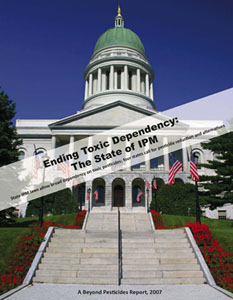Ending Toxic Dependency: The State of IPM
Download Report
High Resolution (2.5 MB) | Low Resolution (792 KB)
With increasing public awareness of pesticide hazards, widespread agreement has emerged that integrated pest management (IPM) and organic practices are preferred land and structural management tools in both (i) embracing concerns about protecting health and the environment and (ii) utilizing practices that are efficacious and cost effective. However, in the field of IPM, an approach to preventing and controlling unwanted organisms that has a history of varied definitions and policies, there are numerous perspectives, and critical disagreements, among public health and environmental advocates, regulators, and the pesticide and pest management industry. While organic agricultural practices are clearly codified in federal statute with a definition, acceptable methods and materials, and a certification and enforcement process, there is an absence of federal IPM policy that requires clear, meaningful and enforceable standards and practices for the management of state-owned public land and buildings. This report fills a critical gap in evaluating state IPM laws governing state property in the 50 states and the District of Columbia (hereafter referred to as states) with criteria for effective management benchmarks. Since the laws themselves, however, do not alone ensure the implementation of an IPM program, the assessment in this report includes interviews with state officials and environmental advocates.
State policy restricting pesticide use on state-owned and managed property serves as an important measure of public health and environmental protection, given the widespread chemical exposure associated with the management of 195 million acres of land area across the U.S., affecting virtually all residents. State policy can also influence the direction of practices used by local jurisdictions (villages, towns, cities and counties) and on private lands, setting a tone that either encourages or discourages pesticide-dependent practices. Local government policy requiring organic or IPM practices is critical in the absence of state and federal law that adequately restricts pesticide use. The evaluation in this report of state laws governing specific species management practices on state-owned and managed property supports the need for defined and effective state IPM and organic programs, codified in policy and effectively carried out.
For more information about the report view a Sample Survey Letter. To talk to pesticide control and IPM officials in your state about the report and recommendations, see a List of State Contacts.
Comments and discussion questions regarding the report are encouraged - please post questions and feedback on Beyond Pesticides' blog.









